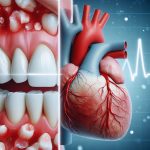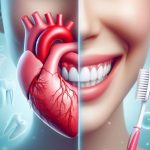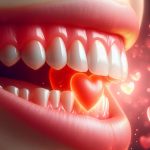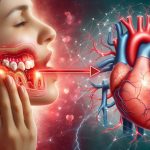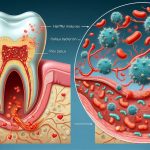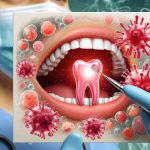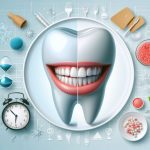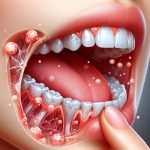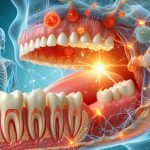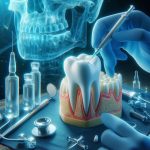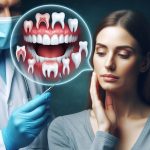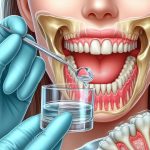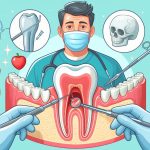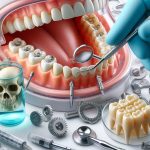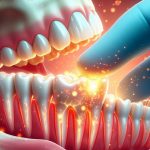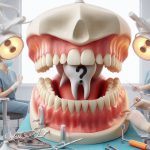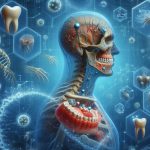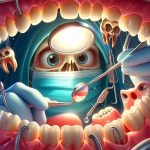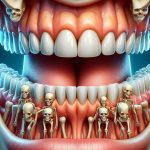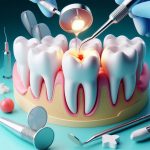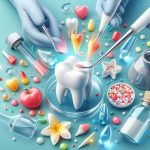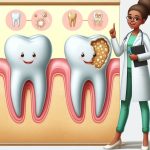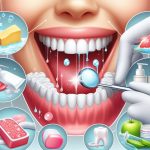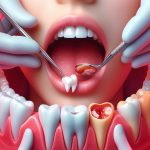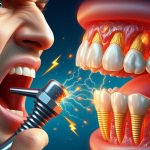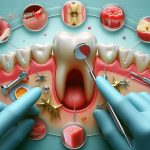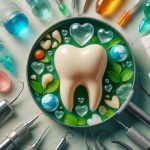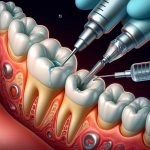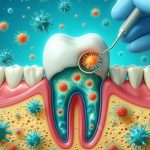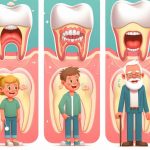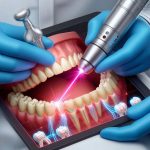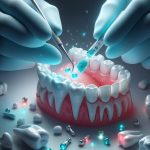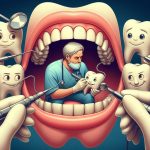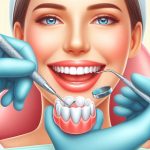Welcome to the Dentals.care Knowledge Hub, your go-to resource for all things dental. Whether you’re looking for tips on maintaining daily oral hygiene, understanding treatment options, or exploring how oral health impacts overall well-being, we’ve got you covered. Dive into our articles and empower yourself with the knowledge to care for your smile confidently.
- How Extended Fasting Affects Your Teeth: A Closer Look at the Risksby ecareExtended fasting has become a popular health trend in recent years, touted for its potential benefits such as weight loss, improved metabolic health, and better mental clarity. However, when engaging in extended fasting—defined as fasting for periods longer than 24 hours—there are concerns that the effects on overall health, particularly oral health, may be overlooked.… Read more: How Extended Fasting Affects Your Teeth: A Closer Look at the Risks
- The Role of Fasting in Minimizing the Risk of Teeth Grindingby ecareTeeth grinding, also known as bruxism, is a widespread issue that affects millions of people around the world. It often occurs unconsciously during sleep or while awake and involves the clenching, grinding, or gnashing of teeth. The consequences of untreated bruxism can be significant, ranging from damage to tooth enamel to jaw pain, headaches, and… Read more: The Role of Fasting in Minimizing the Risk of Teeth Grinding
- How Fasting Can Improve the Healing Process After Tooth Extractionsby ecareTooth extraction is a common dental procedure, whether it’s due to severe decay, infection, overcrowding, or injury. The healing process after a tooth extraction can vary depending on several factors, such as the complexity of the procedure, the patient’s overall health, and how well they follow post-operative care instructions. One increasingly discussed approach to accelerating… Read more: How Fasting Can Improve the Healing Process After Tooth Extractions
- Can Fasting Help Reduce the Need for Expensive Dental Treatments?by ecare1. Understanding Fasting and Its Mechanisms Types of Fasting Fasting is not a one-size-fits-all practice. There are multiple types of fasting protocols, each with unique mechanisms and potential benefits. Understanding the different fasting methods is crucial to appreciating how they may impact oral health: Biological Mechanisms of Fasting Fasting triggers several important biological mechanisms in… Read more: Can Fasting Help Reduce the Need for Expensive Dental Treatments?
- Fasting and Its Potential to Reduce Oral Mucosal Inflammationby ecareWhat is Fasting? Fasting is the voluntary act of abstaining from food or drink for a specific period of time. While this practice has been known and utilized for centuries, ranging from spiritual and religious rituals to medical therapies, it has recently gained attention for its potential health benefits. There are various types of fasting… Read more: Fasting and Its Potential to Reduce Oral Mucosal Inflammation
- Fasting and Its Effect on Taste Sensitivity and Oral Healthby ecareFasting has been practiced for centuries, not only for religious and spiritual reasons but also for health and wellness purposes. In recent years, fasting, particularly intermittent fasting (IF), has gained widespread popularity as a potential strategy for weight loss, improving metabolic health, and even promoting longevity. However, while the benefits of fasting are often discussed… Read more: Fasting and Its Effect on Taste Sensitivity and Oral Health
- Is Fasting Effective for People with Periodontal Disease?by ecarePeriodontal disease, which encompasses a range of conditions affecting the gums and the structures supporting the teeth, is a significant concern for millions of people worldwide. It has a profound impact on overall oral health, potentially leading to tooth loss, systemic inflammation, and other serious health issues. Treatment typically involves improving oral hygiene, professional cleanings,… Read more: Is Fasting Effective for People with Periodontal Disease?
- Fasting and the Impact on Your Jaw Health and TMJby ecareFasting has become a popular practice worldwide, primarily for its potential health benefits such as weight loss, enhanced metabolic function, and even longevity. Various forms of fasting, such as intermittent fasting and prolonged water fasting, have garnered significant attention from health enthusiasts and researchers alike. However, while fasting has its well-documented benefits, there are aspects… Read more: Fasting and the Impact on Your Jaw Health and TMJ
- How Extended Fasting Affects Your Teeth: A Closer Look at the Risksby ecareExtended fasting refers to any fasting period longer than 24 hours, where individuals refrain from consuming food for extended periods. Unlike intermittent fasting, where people eat during specific time windows, extended fasting involves a prolonged abstinence from food, sometimes lasting several days. This practice has gained popularity in recent years due to its potential health… Read more: How Extended Fasting Affects Your Teeth: A Closer Look at the Risks
- The Psychological Benefits of Fasting: A Positive Impact on Oral Health Habitsby ecareFasting has been practiced for centuries, with roots in religious rituals, health regimes, and even survival tactics. While fasting is traditionally linked to physical benefits like weight loss, metabolic improvements, and cellular repair, recent research has highlighted its psychological advantages as well. These benefits extend beyond cognitive enhancement and stress reduction to affect a surprisingly… Read more: The Psychological Benefits of Fasting: A Positive Impact on Oral Health Habits
- How Fasting Can Enhance the Effectiveness of Oral Care Productsby ecareOral health is undeniably one of the cornerstones of good health. While the modern world offers a range of advanced oral hygiene products, including toothpaste, mouthwash, and floss, maintaining optimal oral health remains a challenge for many individuals. Despite brushing twice a day, flossing, and using high-quality oral care products, many still suffer from tooth… Read more: How Fasting Can Enhance the Effectiveness of Oral Care Products
- Can Fasting Help Alleviate the Symptoms of Dry Mouth?by ecareFasting, an ancient practice embraced by various cultures for both spiritual and health-related reasons, has seen a resurgence in recent years due to its potential benefits for overall health. From weight management to reducing chronic inflammation, fasting has demonstrated a wide array of positive effects on the body. However, one aspect of health that has… Read more: Can Fasting Help Alleviate the Symptoms of Dry Mouth?
- Is Your Heart at Risk? How Poor Oral Health Could Be a Silent Indicator of Heart Diseaseby ecareOral health is often overlooked as a direct contributor to overall health, with many people seeing dental hygiene as a standalone practice for keeping teeth and gums healthy. However, research in recent years has revealed a startling connection between poor oral health and serious systemic health conditions, especially heart disease. While brushing and flossing are… Read more: Is Your Heart at Risk? How Poor Oral Health Could Be a Silent Indicator of Heart Disease
- Brushing for Your Heart: Why Oral Hygiene Matters for Preventing Heart Diseaseby ecareThe idea that oral hygiene can influence the health of your heart might seem surprising to many, but emerging research is showing a clear connection between the two. Oral health isn’t just about having a bright smile—it can also play a pivotal role in protecting your cardiovascular system. From chronic gum disease to the bacterial… Read more: Brushing for Your Heart: Why Oral Hygiene Matters for Preventing Heart Disease
- Heart Disease and Your Smile: How Gum Health Can Reveal Your Cardiovascular Riskby ecareWhen we think about heart disease, we often imagine the more obvious risk factors: high cholesterol, smoking, sedentary lifestyle, and poor diet. What many people don’t realize is that your gums—those soft tissues in your mouth—could also be providing a clue to your cardiovascular health. It’s a connection that’s become clearer over the past couple… Read more: Heart Disease and Your Smile: How Gum Health Can Reveal Your Cardiovascular Risk
- Could a Toothache Be a Red Flag for Heart Disease? The Unexpected Signs You Shouldn’t Ignoreby ecare1. Introduction to Heart Disease and Toothache The Complexity of Heart Disease Heart disease is not just one condition but a broad spectrum of cardiovascular problems that affect millions worldwide. From coronary artery disease to arrhythmias, each type of heart disease presents its own unique set of symptoms, risk factors, and long-term effects. Coronary artery… Read more: Could a Toothache Be a Red Flag for Heart Disease? The Unexpected Signs You Shouldn’t Ignore
- Your Gums May Be the Key to Your Heart: Discover How Oral Health Impacts Cardiovascular Diseaseby ecareOral health is often relegated to a secondary concern when we think about overall wellness. We brush our teeth daily, perhaps floss occasionally, and visit the dentist once or twice a year. However, what many of us fail to recognize is that the condition of our gums may have much greater implications for our health… Read more: Your Gums May Be the Key to Your Heart: Discover How Oral Health Impacts Cardiovascular Disease
- The Surprising Connection Between Gum Infections and Heart Disease: What Your Dentist Can Tell Youby ecareUnderstanding Gum Infections 1. What Are Gum Infections? Gum infections, also known as periodontal disease, are bacterial infections that affect the tissues surrounding and supporting your teeth. These infections occur when plaque, a sticky, colorless film of bacteria, accumulates on the teeth and gums. If plaque isn’t removed by brushing and flossing, it hardens into… Read more: The Surprising Connection Between Gum Infections and Heart Disease: What Your Dentist Can Tell You
- How Fasting Affects Your Body’s Ability to Fight Oral Bacteriaby ecareFasting has gained popularity in recent years due to its potential health benefits, including weight loss, improved metabolic health, and enhanced longevity. However, a less-discussed but equally important effect of fasting is how it might influence our body’s ability to fight oral bacteria. The human mouth is home to a wide variety of bacteria, both… Read more: How Fasting Affects Your Body’s Ability to Fight Oral Bacteria
- Does Fasting Lead to a Lower Risk of Oral Cancer?by ecareOral cancer is a significant global health concern that impacts millions of people every year. The two main types of oral cancer are oral cavity cancer and oropharyngeal cancer, both of which are associated with high mortality rates if not detected early. The most common risk factors for oral cancer include smoking, alcohol consumption, poor… Read more: Does Fasting Lead to a Lower Risk of Oral Cancer?
- Does Fasting Improve Saliva Production and Oral Hygiene?by ecareBefore we can analyze how fasting influences saliva production, it’s important to understand exactly what saliva is, how it’s produced, and why it is so essential to maintaining optimal oral health. Saliva isn’t merely a liquid that moistens the mouth—it is a biological substance with complex functions, essential to the health of your teeth, gums,… Read more: Does Fasting Improve Saliva Production and Oral Hygiene?
- The Connection Between Fasting and Tooth Enamel Strengthby ecareTooth enamel, the hard, outer layer of your teeth, plays a crucial role in maintaining dental health. It acts as a shield that protects the sensitive inner layers of teeth, preventing damage from bacteria, acids, and physical wear. Yet, enamel is not invincible. Over time, it can wear away, leading to weakened teeth and heightened… Read more: The Connection Between Fasting and Tooth Enamel Strength
- Fasting for Fresh Breath: How Taking a Break from Food May Help with Bad Breathby ecareHalitosis, more commonly known as bad breath, is a condition that affects millions of people worldwide, impacting social interactions, self-esteem, and overall quality of life. While bad breath can often be traced to poor oral hygiene, it can also stem from a variety of other sources, including underlying health conditions, food choices, and imbalances in… Read more: Fasting for Fresh Breath: How Taking a Break from Food May Help with Bad Breath
- Fasting and Teeth Whitening: Is There a Link?by ecareFasting, a practice as old as human civilization, has been embraced for various reasons across cultures and religions. Whether for spiritual cleansing, health benefits, or detoxification, fasting has gained increasing popularity in modern wellness practices. While traditional fasting typically referred to periods of abstinence from all food and drink, contemporary methods such as intermittent fasting… Read more: Fasting and Teeth Whitening: Is There a Link?
- The Impact of Extended Fasting on Tooth Sensitivityby ecareIn recent years, extended fasting and intermittent fasting have become increasingly popular due to their reported health benefits, which include improved metabolic health, enhanced cognitive function, and even potential longevity benefits. Celebrities, athletes, and wellness influencers have all endorsed fasting, contributing to its surge in popularity. Alongside these physical benefits, many individuals are looking for… Read more: The Impact of Extended Fasting on Tooth Sensitivity
- How Fasting Supports a Healthier Oral Microbiomeby ecareThe oral microbiome refers to the vast and complex community of microorganisms that inhabit the mouth, including bacteria, fungi, viruses, and other microbes. This delicate ecosystem is essential for maintaining oral health, as it plays a significant role in preventing diseases like tooth decay, gum disease, and bad breath. A balanced oral microbiome contributes to… Read more: How Fasting Supports a Healthier Oral Microbiome
- Does Fasting Lead to Fewer Dental Visits? Exploring the Long-Term Benefitsby ecareIn recent years, fasting has gained considerable attention as a health trend, often associated with weight loss, improved metabolic function, and increased longevity. But what about its effects on other areas of health, such as oral care? Could fasting, particularly intermittent fasting, lead to fewer dental visits and potentially reduce the frequency of costly dental… Read more: Does Fasting Lead to Fewer Dental Visits? Exploring the Long-Term Benefits
- Can Fasting Aid in Healing After Dental Procedures?by ecareDental procedures—whether routine cleanings, fillings, root canals, or major surgeries like extractions and implants—often require significant post-operative care. Healing in the oral cavity, while generally efficient, is still a process that can be complicated by factors like inflammation, infection, and tissue damage. As people increasingly look for holistic ways to support their recovery, fasting has… Read more: Can Fasting Aid in Healing After Dental Procedures?
- Can Fasting Improve Your Smile? The Surprising Connection Between Diet and Teethby ecareFasting has long been practiced for spiritual reasons, but in recent years, its health benefits have gained much attention. The concept of fasting is relatively simple: it involves abstaining from food or restricting calorie intake for a period of time. However, what’s often overlooked is how fasting can positively affect oral health. The mouth is… Read more: Can Fasting Improve Your Smile? The Surprising Connection Between Diet and Teeth
- Fasting and Oral Health: The Science Behind Itby ecare1. What is Fasting? Fasting has been practiced for centuries, dating back to ancient civilizations, as a means of promoting health, spiritual enlightenment, and detoxification. In modern times, it has gained significant popularity as a therapeutic tool for weight management, improving metabolic health, and even promoting longevity. But what exactly is fasting? At its core,… Read more: Fasting and Oral Health: The Science Behind It
- Fasting and Hydration: How Drinking Water During Fasting Supports Oral Healthby ecareFasting is the voluntary abstinence from food and sometimes liquids, for a specific period. It has been practiced for centuries for various reasons, including spiritual, health, and detoxification purposes. More recently, fasting has gained popularity due to its association with weight loss, improved metabolic health, and potential longevity benefits. There are many forms of fasting,… Read more: Fasting and Hydration: How Drinking Water During Fasting Supports Oral Health
- The Role of Fasting in Reducing Oral Inflammation and Painby ecareOral health is often regarded as a reflection of overall health, with conditions like gingivitis and temporomandibular joint (TMJ) disorders highlighting the intricate link between systemic inflammation and oral discomfort. These conditions, though common, can have a significant impact on the quality of life, leading to pain, discomfort, and even psychological distress. Finding effective, non-invasive… Read more: The Role of Fasting in Reducing Oral Inflammation and Pain
- Fasting for Gum Health: Why Giving Your Mouth a Break Could Be Beneficialby ecareIntroduction and Overview The Concept of Fasting and Its Significance Fasting, historically intertwined with various religious and spiritual practices, has garnered widespread attention in modern health circles due to its potential benefits for longevity, metabolic health, and disease prevention. The practice of fasting involves voluntarily abstaining from food or drink for a certain period, with… Read more: Fasting for Gum Health: Why Giving Your Mouth a Break Could Be Beneficial
- How Fasting Can Help You Maintain a Healthier Diet, Leading to Better Oral Hygieneby ecareFasting is an age-old practice, revered for its spiritual, physical, and mental benefits. From ancient civilizations to modern health trends, fasting has undergone numerous adaptations and has recently been heralded for its potential health benefits, including improved metabolism, weight loss, and disease prevention. But beyond these well-known advantages, fasting also has indirect benefits that extend… Read more: How Fasting Can Help You Maintain a Healthier Diet, Leading to Better Oral Hygiene
- Intermittent Fasting and Your Teeth: Can It Help Prevent Cavities?by ecareIntermittent fasting (IF) has garnered significant attention as an effective way to manage weight, boost metabolism, improve mental clarity, and even extend lifespan. However, an often-overlooked area where IF might have an impact is in the realm of oral health. Many people who practice IF are focused on the benefits for their bodies and minds,… Read more: Intermittent Fasting and Your Teeth: Can It Help Prevent Cavities?
- How Fasting Can Improve Your Oral Health: A Comprehensive Guideby ecareOverview of Fasting Fasting is an ancient practice that has been embraced for various reasons, from religious observances to health and wellness benefits. In modern times, intermittent fasting and other fasting methods have gained popularity as part of health regimens. While much attention is focused on its benefits for weight loss, metabolic health, and longevity,… Read more: How Fasting Can Improve Your Oral Health: A Comprehensive Guide
- Early Signs of Abnormal Bone Growth in the Mouth: How to Spot and Treat Themby ecareAbnormal bone growth in the mouth refers to a range of conditions where the natural bone structure of the oral cavity undergoes unusual changes. These changes can occur in the jawbone, teeth-supporting bones, or even the soft tissues surrounding the mouth. While bone growth is a normal part of human development, when it happens abnormally,… Read more: Early Signs of Abnormal Bone Growth in the Mouth: How to Spot and Treat Them
- The Link Between Chronic Inflammation and Bone Growth in the Mouth”by ecareChronic inflammation in the mouth, particularly as a result of gum disease, is not just about irritated or bleeding gums. Over time, if left untreated, the inflammatory response can lead to significant alterations in the bone structure that supports teeth. The connection between inflammation and bone health is complex and not limited to bone resorption… Read more: The Link Between Chronic Inflammation and Bone Growth in the Mouth”
- How Abnormal Bone Growth Can Lead to Misalignment, Pain, and Other Oral Health Problemsby ecareBone growth in the oral and jaw regions plays a fundamental role in shaping the human face and facilitating essential functions like speaking, chewing, and breathing. Abnormalities in bone growth, however, can have profound and far-reaching effects on both aesthetics and functionality. While bone growth is generally a natural, gradual process, certain disorders or disruptions… Read more: How Abnormal Bone Growth Can Lead to Misalignment, Pain, and Other Oral Health Problems
- Why Bone Growths in the Mouth Can Sometimes Go Unnoticed Until It’s Too Lateby ecareBone growths in the mouth, though often benign, can be puzzlingly difficult to detect. These growths, ranging from small bumps on the palate to more noticeable protrusions along the jaw, are typically asymptomatic and can remain unnoticed for years, sometimes even decades. The silent development of these growths can be alarming when, in rare cases,… Read more: Why Bone Growths in the Mouth Can Sometimes Go Unnoticed Until It’s Too Late
- Extra Teeth, Bone Spurs, and the Hidden Risks to Your Oral Healthby ecareOral health is often taken for granted until a major issue arises. People tend to focus on the obvious symptoms, such as cavities, gum disease, or bad breath. However, there are numerous subtle conditions that can develop within the oral cavity, which may not show immediate symptoms but can lead to long-term complications if left… Read more: Extra Teeth, Bone Spurs, and the Hidden Risks to Your Oral Health
- Is Your Smile at Risk? The Silent Growths That Affect Oral Healthby ecareOral health is one of the cornerstones of overall well-being, yet it is often overlooked until a noticeable problem arises. While most people are aware of cavities and gum disease, there is a category of oral health issues that silently threaten our smiles—oral growths. These growths can develop gradually, often without immediate symptoms, leading many… Read more: Is Your Smile at Risk? The Silent Growths That Affect Oral Health
- The Importance of Regular X-rays in Detecting Hidden Oral Bone Growthsby ecareOral health is often overlooked in discussions of overall well-being. The condition of our teeth and gums can influence our quality of life in ways that are easy to take for granted until issues arise. That’s why regular dental check-ups are essential—not just for ensuring a bright smile, but for catching potential health problems before… Read more: The Importance of Regular X-rays in Detecting Hidden Oral Bone Growths
- How to Prevent Abnormal Bone Growth in the Mouth: Tips for a Healthy Smileby ecareThe human body is a finely tuned system where each part is designed to work in harmony. One critical component is the mouth and jaw, which not only enable us to chew and speak but also house some of the most important structures in the body. The teeth, gums, and jawbones must function optimally to… Read more: How to Prevent Abnormal Bone Growth in the Mouth: Tips for a Healthy Smile
- A Patient’s Comprehensive Guide to Post-Surgical Care and Recovery After Removal of Extra Teeth or Bone Growth in the Mouthby ecareOral surgery, especially for the removal of extra teeth (supernumerary teeth) or abnormal bone growths in the mouth (like exostoses or tori), is often recommended when such issues pose risks to overall oral health. These conditions, though not always problematic, can lead to overcrowding, misalignment of teeth, pain, difficulty chewing, or speech issues. In some… Read more: A Patient’s Comprehensive Guide to Post-Surgical Care and Recovery After Removal of Extra Teeth or Bone Growth in the Mouth
- The Role of Orthodontics in Treating Extra Teeth and Abnormal Bone Growthby ecareOrthodontics is the specialized branch of dentistry that focuses on diagnosing, preventing, and correcting malocclusions (misalignments) of the teeth and jaws. It is a multifaceted discipline that requires an understanding of both dental and skeletal structures, as well as the interactions between the two. The role of orthodontics extends beyond just cosmetic improvements; it plays… Read more: The Role of Orthodontics in Treating Extra Teeth and Abnormal Bone Growth
- The Psychological Effects of Extra Teeth: How They Can Impact Confidence and Self-Esteem”by ecareExtra teeth, also known as supernumerary teeth, are a common yet often overlooked dental anomaly. These additional teeth can appear anywhere in the mouth and may range from small, rudimentary teeth to fully developed, functional ones. While some people may only experience minimal discomfort, the emotional and psychological effects of having extra teeth can be… Read more: The Psychological Effects of Extra Teeth: How They Can Impact Confidence and Self-Esteem”
- Bone Growth and Impact on Gums: What Happens When Bone Spurs Affect Gum Healthby ecareBone health is integral to the overall well-being of the oral cavity. Teeth, gums, and the jawbone work in harmony to maintain structural integrity and proper function. The interaction between the hard tissues (bones) and soft tissues (gums) is crucial for maintaining healthy teeth and gums. When bone growth becomes abnormal, such as in the… Read more: Bone Growth and Impact on Gums: What Happens When Bone Spurs Affect Gum Health
- The Role of Diet and Lifestyle in Preventing or Exacerbating Bone Growth in the Mouthby ecareBone health plays a crucial role in maintaining a functional, healthy mouth. While many people focus on the importance of dental hygiene and oral care, fewer realize that bone density in the jaw and around the teeth is just as vital. The bones of the mouth, including the maxilla (upper jaw), mandible (lower jaw), and… Read more: The Role of Diet and Lifestyle in Preventing or Exacerbating Bone Growth in the Mouth
- When Should You Consider Surgery for Excess Bone Growth or Extra Teethby ecareAbnormal bone growth and extra teeth, though often overlooked in routine dental check-ups, can significantly impact both the health and aesthetics of an individual’s mouth. These conditions can arise for a variety of reasons—genetic factors, trauma, or even as a result of an underlying medical issue. While not all cases require surgical intervention, understanding when… Read more: When Should You Consider Surgery for Excess Bone Growth or Extra Teeth
- “Why Extra Teeth and Bone Growths in the Mouth Could Be More Harmful Than You Think”by ecareWhen we think of dental issues, we often imagine cavities, gum disease, or the occasional tooth extraction. However, one of the more complex dental concerns that can arise is the presence of extra teeth (supernumerary teeth) or abnormal bone growths in the mouth (exostosis). These conditions, though not as commonly discussed as cavities or gum… Read more: “Why Extra Teeth and Bone Growths in the Mouth Could Be More Harmful Than You Think”
- When Bone Grows Where It Shouldn’t: The Surprising Causes of Oral Bone Growthby ecareBone growth is typically a well-regulated process essential for developing a healthy skeleton. The human body has intricate systems that ensure bones grow in the right places and the right amounts. However, when bone grows where it shouldn’t, particularly in the oral cavity, it can lead to significant health problems. Abnormal bone growth in the… Read more: When Bone Grows Where It Shouldn’t: The Surprising Causes of Oral Bone Growth
- Are You Prone to Extra Teeth? How Genetic and Environmental Factors Play a Roleby ecareThe human body is an incredibly complex and intricate organism, and one of the most fascinating aspects of human development is the formation of our teeth. While most people have the standard set of 32 adult teeth, some individuals are born with extra teeth—known as supernumerary teeth. These additional teeth can develop anywhere in the… Read more: Are You Prone to Extra Teeth? How Genetic and Environmental Factors Play a Role
- From Childhood to Adulthood: How Excessive Bone Growth in the Mouth Changes Over Timeby ecareExcessive bone growth in the mouth is a condition that can have a profound impact on an individual’s oral health and overall quality of life. Whether it manifests in childhood or progresses into adulthood, changes in the bone structure of the mouth require a thorough understanding to manage effectively. From genetic factors to environmental influences,… Read more: From Childhood to Adulthood: How Excessive Bone Growth in the Mouth Changes Over Time
- “The Role of Genetics in Abnormal Bone Growth and Extra Teeth Formation”by ecareAbnormalities in bone growth and the development of supernumerary teeth can significantly impact an individual’s quality of life, leading to functional, aesthetic, and psychological challenges. Craniofacial disorders related to abnormal bone growth and extra teeth formation can present in a wide range of forms and severity, from minor anomalies that are asymptomatic to severe conditions… Read more: “The Role of Genetics in Abnormal Bone Growth and Extra Teeth Formation”
- The Unseen Consequences of Mouth Bone Growth: Treatment and Prevention Tipsby ecareThe mouth serves as more than just a place for eating and speaking—it plays a critical role in shaping our facial features, influencing the mechanics of speech, and maintaining overall oral health. Central to this is the growth and development of mouth bones, which influence the alignment of the teeth, the stability of the jaw,… Read more: The Unseen Consequences of Mouth Bone Growth: Treatment and Prevention Tips
- “From Extra Teeth to Bone Spurs: Uncovering the Mystery of Hidden Oral Growths”by ecareThe human body is full of intricacies and surprises. It’s a finely tuned system, with various organs and tissues constantly at work to maintain health and function. Sometimes, however, the body creates structures or growths that are unexpected and not immediately understood. This includes anomalies that can occur within the oral cavity—some of which are… Read more: “From Extra Teeth to Bone Spurs: Uncovering the Mystery of Hidden Oral Growths”
- The Hidden Dangers of Osseous Growth: Understanding Bone Abnormalities in Your Mouthby ecareIn the realm of oral health, many people are familiar with common issues such as cavities, gum disease, and tooth decay. However, there are hidden dangers within the mouth that are less frequently discussed—osseous growths or abnormalities in the bone structure of the jaw and surrounding areas. These growths may seem benign at first but… Read more: The Hidden Dangers of Osseous Growth: Understanding Bone Abnormalities in Your Mouth
- “Extra Teeth and Abnormal Bone Growth: What Your Dentist Wishes You Knew”by ecareDental health is often seen as something that only requires attention when problems arise—like a cavity, gum disease, or the occasional toothache. However, there are numerous other conditions that can affect the teeth and bones in the mouth, many of which are not immediately apparent. One of these conditions is the development of extra teeth,… Read more: “Extra Teeth and Abnormal Bone Growth: What Your Dentist Wishes You Knew”
- “Silent Impact: How Hidden Bone Growth in the Mouth Affects Your Dental Health”by ecareOral health is often associated with the condition of your teeth and gums. However, the foundation of a healthy mouth extends beyond just brushing, flossing, and visiting the dentist. One critical yet often overlooked component is the bone structure inside the mouth, particularly the jawbone. Bone growth in the mouth, whether gradual or sudden, can… Read more: “Silent Impact: How Hidden Bone Growth in the Mouth Affects Your Dental Health”
- Why Your Dentist Might Recommend a Filling Over a Crownby ecareRestorative dentistry offers a variety of treatments designed to repair and preserve damaged teeth. Among the most common treatments are dental fillings and crowns, both of which restore functionality and aesthetics to compromised teeth. But when faced with a choice between these two options, a patient might wonder: “Why did my dentist recommend a filling… Read more: Why Your Dentist Might Recommend a Filling Over a Crown
- Can You Still Eat and Drink Normally After Getting a Filling?by ecareDental fillings are a fundamental aspect of modern dentistry, designed to restore the structure and function of teeth affected by cavities, trauma, or decay. While dental fillings have long been a part of routine dental care, many patients find themselves wondering about the post-treatment care and whether they can go back to their normal eating… Read more: Can You Still Eat and Drink Normally After Getting a Filling?
- Cavity Filling vs. Root Canal: A Detailed Comparisonby ecareOral health is one of the cornerstones of overall well-being. It’s no surprise that many of us prioritize brushing, flossing, and visiting the dentist regularly. Yet, despite our best efforts, issues such as cavities or tooth infections are still prevalent. These problems are often treated with dental procedures such as cavity fillings or root canals.… Read more: Cavity Filling vs. Root Canal: A Detailed Comparison
- Resin-Based Fillings: Pros, Cons, and Usesby ecareResin-based fillings, also known as composite fillings, are a modern solution for repairing cavities and restoring damaged teeth. Unlike traditional amalgam fillings made from a mixture of metals, resin-based fillings are composed of synthetic resins that are often mixed with other materials like silica, glass, and quartz to form a durable and tooth-colored filling material.… Read more: Resin-Based Fillings: Pros, Cons, and Uses
- Can You Get a Filling if You Have a Deep Cavity?by ecareCavities are one of the most common dental problems worldwide. They result from the process of tooth decay, which is caused by bacteria in the mouth feeding on sugars and producing acids. Over time, this acid erodes the tooth enamel, the outermost layer of your teeth. Once the enamel is compromised, the bacteria can penetrate… Read more: Can You Get a Filling if You Have a Deep Cavity?
- A Beginner’s Guide to Understanding the Different Filling Materials Availableby ecareFilling materials are the unsung heroes of many products we use in everyday life, often hidden beneath the surface but crucial for the performance, comfort, and longevity of various items. Filling materials serve as the core of products like pillows, mattresses, furniture cushions, insulation materials, and even car seats. Understanding the different types of fillings… Read more: A Beginner’s Guide to Understanding the Different Filling Materials Available
- Fillings and Cosmetic Concerns: Can Fillings Be Matched to Your Natural Tooth Color?by ecareDental fillings play a critical role in maintaining the function, health, and aesthetics of your teeth. Fillings are necessary when teeth experience decay or damage, and they are a cornerstone of restorative dentistry. Historically, fillings were primarily made from materials like amalgam or gold, both of which were highly effective but visually conspicuous. Over time,… Read more: Fillings and Cosmetic Concerns: Can Fillings Be Matched to Your Natural Tooth Color?
- What Happens if a Cavity is Left Untreated? The Importance of Early Detectionby ecareDental cavities are one of the most prevalent health issues worldwide, affecting individuals of all ages. Despite the availability of preventive measures and advanced treatments, cavities continue to be a widespread problem, often resulting in severe complications if left untreated. Understanding the process of cavity formation, its impact on oral and systemic health, and the… Read more: What Happens if a Cavity is Left Untreated? The Importance of Early Detection
- The Risks of Ignoring a Cavity: Why Timely Fillings Are Crucialby ecareDental cavities are one of the most common and preventable oral health problems that people face, yet they remain a serious concern. Dental caries, also known as cavities or tooth decay, are caused by the destruction of tooth enamel due to the action of acids produced by bacteria in the mouth. If cavities are left… Read more: The Risks of Ignoring a Cavity: Why Timely Fillings Are Crucial
- How to Prevent Cavities and Avoid Fillings: Tips for a Healthy Smileby ecareA healthy smile is not only a sign of confidence but also a vital part of your overall well-being. Oral health has a direct connection to your systemic health, affecting everything from your ability to chew and speak to your overall immune function. One of the most common dental issues people face are cavities—small holes… Read more: How to Prevent Cavities and Avoid Fillings: Tips for a Healthy Smile
- Dental Fillings for Older Adults: Special Considerationsby ecareAs people age, maintaining good oral health becomes even more critical. Older adults face unique dental challenges due to natural changes in their teeth and gums, as well as underlying medical conditions that may affect their overall oral health. Dental fillings, one of the most common procedures in restorative dentistry, play a vital role in… Read more: Dental Fillings for Older Adults: Special Considerations
- How to Prepare for a Dental Filling Appointment: Tips and Adviceby ecareVisiting the dentist is often a source of anxiety for many people. The thought of a needle, a drill, or even the unknowns of what to expect can make the idea of dental treatment seem intimidating. However, a dental filling is a routine procedure that’s common, safe, and typically done without much discomfort. If you’re… Read more: How to Prepare for a Dental Filling Appointment: Tips and Advice
- Inlay and Onlay Fillings: What They Are and How They Compare to Regular Fillingsby ecareDental fillings are a fundamental aspect of restorative dentistry, used to repair teeth damaged by decay, trauma, or wear. While traditional fillings have been a staple for smaller cavities, the need for more durable and aesthetically pleasing restorations has given rise to inlay and onlay fillings. These restorations offer significant benefits, particularly for patients requiring… Read more: Inlay and Onlay Fillings: What They Are and How They Compare to Regular Fillings
- How Fillings Affect Your Ability to Chew and Speakby ecareDental fillings, as a common treatment for cavities, play a vital role in maintaining the health and function of our teeth. They restore the tooth’s structure and prevent further decay, ensuring that the tooth remains strong and functional. However, while the primary purpose of a filling is to restore the damaged or decayed tooth, it… Read more: How Fillings Affect Your Ability to Chew and Speak
- Fillings and Your Overall Health: Is There a Link?by ecareDental fillings are essential for repairing cavities and restoring the structural integrity of teeth. Cavities, caused by tooth decay, are among the most common health issues worldwide. In the past, dental fillings were primarily made from silver amalgam, a mixture of metals that includes mercury. Over time, concerns have emerged regarding the safety of mercury,… Read more: Fillings and Your Overall Health: Is There a Link?
- The Role of Dental Fillings in Cosmetic Dentistryby ecareCosmetic dentistry has evolved significantly over the last few decades. Once, dental treatments were purely restorative, focused mainly on health and function. Today, with the rise of aesthetic concerns, dental professionals often blend restorative treatments with cosmetic ones, enhancing both the health and appearance of patients’ teeth. Fillings, once considered simple restorations to correct cavities,… Read more: The Role of Dental Fillings in Cosmetic Dentistry
- The Impact of Bruxism (Teeth Grinding) on Fillings: A Comprehensive Analysisby ecareBruxism—an often-overlooked condition characterized by involuntary teeth grinding and jaw clenching—can have far-reaching effects on the overall oral health of an individual, particularly on restorative dental treatments such as fillings. While fillings are designed to withstand normal pressures from chewing and biting, the force exerted by bruxism can quickly deteriorate even the strongest dental materials.… Read more: The Impact of Bruxism (Teeth Grinding) on Fillings: A Comprehensive Analysis
- The Connection Between Fillings and Gum Health: Understanding the Impact of Dental Fillings on Gum Tissueby ecareDental fillings are one of the most common and effective treatments in modern dentistry. They serve to restore teeth that have been damaged by cavities, protecting against further decay and helping to maintain normal tooth function. However, many patients and even some dental professionals may overlook an important aspect of filling treatment: the effect fillings… Read more: The Connection Between Fillings and Gum Health: Understanding the Impact of Dental Fillings on Gum Tissue
- The Environmental Impact of Dental Fillings: A Comprehensive Analysis of Sustainability in Dental Materialsby ecareDental fillings are a key part of oral healthcare, serving to restore teeth damaged by decay, trauma, or wear. They provide both functional and aesthetic value, making them integral to modern dental practice. However, just as healthcare practices aim to improve human well-being, it is critical to evaluate their environmental implications. As climate change, pollution,… Read more: The Environmental Impact of Dental Fillings: A Comprehensive Analysis of Sustainability in Dental Materials
- Why Some People Need Multiple Fillings: A Comprehensive Guideby ecareDental fillings are a cornerstone of restorative dentistry. They are used to repair teeth that have been damaged by decay, thus restoring the tooth’s original shape and functionality. For some individuals, multiple fillings become a regular part of their dental routine, and the reasons behind this can vary greatly. In this guide, we will explore… Read more: Why Some People Need Multiple Fillings: A Comprehensive Guide
- How to Handle a Filling That Falls Out: A Comprehensive Guideby ecareDental fillings are a crucial aspect of maintaining dental health, helping to restore teeth affected by cavities or decay. However, like all things in life, fillings are not immune to wear and tear. While dental fillings are designed to last a long time, they can occasionally fall out or become loose. If this happens unexpectedly,… Read more: How to Handle a Filling That Falls Out: A Comprehensive Guide
- Filling Replacement: When and Why It’s Necessaryby ecareDental fillings play a crucial role in modern dentistry, helping to restore damaged teeth caused by cavities or decay. While they are designed to last for many years, they are not permanent. Over time, fillings can become compromised, requiring replacement to prevent further damage or discomfort. This comprehensive guide explores the various reasons why fillings… Read more: Filling Replacement: When and Why It’s Necessary
- The Role of Dental Fillings in Preventing Further Decay and Protecting Tooth Structureby ecareDental fillings are one of the most common dental procedures used today. In essence, fillings are used to treat cavities, which are areas of the tooth that have been decayed by bacterial action. Tooth decay is a progressive process, starting from minor enamel erosion and leading to more severe conditions that can affect the internal… Read more: The Role of Dental Fillings in Preventing Further Decay and Protecting Tooth Structure
- How to Identify When You Need a Dental Filling: A Comprehensive Guideby ecareYour oral health is a crucial part of your overall well-being, and being proactive in identifying dental issues can save you from pain, expensive procedures, and long-term damage. One of the most common dental treatments is the dental filling, used to treat cavities or damaged teeth. While regular checkups with your dentist are the best… Read more: How to Identify When You Need a Dental Filling: A Comprehensive Guide
- “The Effect of Diet on the Longevity of Your Fillings”by ecareDental fillings are commonly used to restore teeth that have been affected by decay, cracks, or other damage. Once in place, fillings help to seal off cavities, reduce pain, and prevent further damage. However, despite their durability, fillings are not impervious to wear and tear. One of the major contributing factors to the lifespan of… Read more: “The Effect of Diet on the Longevity of Your Fillings”
- “Choosing Between Fillings and Sealants: What’s Best for Your Teeth?”by ecareDental fillings and dental sealants are two of the most common procedures in modern dentistry, yet they are often confused due to their similar goals of preserving tooth health and preventing future issues. Understanding the purpose, application, types, and differences between these treatments is vital for maintaining optimal oral health. Fillings are primarily used to… Read more: “Choosing Between Fillings and Sealants: What’s Best for Your Teeth?”
- How Pregnancy Affects Your Dental Fillings and Tooth Healthby ecarePregnancy is a unique and transformative experience, not just for a woman’s body but for every aspect of her health, including her dental care. While most expectant mothers focus on prenatal care, diet, and overall health, dental health during pregnancy is often overlooked. The hormonal shifts, changes in oral hygiene habits, and new eating patterns… Read more: How Pregnancy Affects Your Dental Fillings and Tooth Health
- Innovations in Filling Materials: What’s New in Dentistry?by ecareDental fillings are among the most common treatments in restorative dentistry. They help preserve the structure and function of teeth that have been compromised by decay or damage. Over the years, dental fillings have evolved from basic materials to complex, multi-functional substances designed not only to restore but also to enhance the longevity and appearance… Read more: Innovations in Filling Materials: What’s New in Dentistry?
- How Age Affects the Need for Fillings: Exploring the Differences Across Children, Adults, and the Elderlyby ecareDental fillings are an essential part of modern dental care, used to restore a tooth’s function and shape when it becomes decayed or damaged. However, the need for fillings can vary significantly depending on a person’s age. Age-related changes in tooth enamel, lifestyle habits, and overall health all play a role in influencing the frequency… Read more: How Age Affects the Need for Fillings: Exploring the Differences Across Children, Adults, and the Elderly
- Laser Dentistry for Fillings: What Are the Benefits?by ecareIn the rapidly advancing world of medical and dental technology, one of the most notable innovations in recent years is the use of laser technology in dentistry. Specifically, laser dentistry for fillings has become a game-changer, offering patients a more comfortable, efficient, and precise alternative to traditional dental procedures. Laser technology has made significant strides… Read more: Laser Dentistry for Fillings: What Are the Benefits?
- How Stress Can Impact Your Fillings: Understanding the Link Between Stress and Dental Healthby ecareStress—whether from work, relationships, health issues, or daily life challenges—affects nearly everyone at some point. It is a natural physiological and psychological response to demands or threats, often described in terms of “fight or flight.” While short bursts of stress can be manageable and even helpful for survival or motivation, chronic stress can have far-reaching… Read more: How Stress Can Impact Your Fillings: Understanding the Link Between Stress and Dental Health
- “Caring for Fillings After a Major Dental Procedureby ecareComprehensive Overview: What Happens After Multiple Fillings When you’ve had multiple fillings placed during a single dental visit, this could involve various procedures and treatments to address cavities, structural damage, or decay in multiple teeth. In most cases, the fillings will be made of composite resin, amalgam, or other durable materials that restore the tooth’s… Read more: “Caring for Fillings After a Major Dental Procedure
- Filling Materials for Sensitive Teeth: An In-Depth Explorationby ecareTooth sensitivity remains one of the most common complaints encountered in dental practice, with a significant portion of the population experiencing varying degrees of discomfort. This sensitivity, often exacerbated by temperature fluctuations, acidic foods, or mechanical pressure, can severely affect a patient’s ability to maintain optimal oral hygiene and enjoy everyday activities such as eating… Read more: Filling Materials for Sensitive Teeth: An In-Depth Exploration
- The Evolution of Dental Fillings: From Silver to High-Tech Materialsby ecareDental fillings have long been an essential part of modern dentistry, serving as an effective solution to restore teeth that have been damaged by decay. The history of dental fillings reflects advancements in material science, technology, and an ever-deepening understanding of the importance of preserving tooth health. Over centuries, what began as a rudimentary and… Read more: The Evolution of Dental Fillings: From Silver to High-Tech Materials
- Are Tooth-Colored Fillings the Right Choice for You?by ecareWhen it comes to maintaining dental health, one of the most common procedures people undergo is getting a dental filling to treat cavities. Over time, dental technology has made significant strides, particularly in the materials used for fillings. Among the most popular options today are tooth-colored fillings, which offer a more aesthetically pleasing alternative to… Read more: Are Tooth-Colored Fillings the Right Choice for You?
- What Causes Fillings to Fail? How to Prevent Itby ecareDental fillings are essential for the restoration of teeth affected by decay, trauma, or wear. A filling is a dental material placed into a cavity or hole to restore the tooth to its normal shape and function. Once a filling is applied, it forms a protective seal against future bacterial invasion and helps preserve the… Read more: What Causes Fillings to Fail? How to Prevent It
- How to Maintain Dental Fillings and Keep Your Smile Healthyby ecareDental fillings are a vital part of modern dental care. They help restore the structure and function of teeth that have been affected by cavities, cracks, or other forms of damage. With a proper understanding of how fillings work and what you can do to maintain them, you can keep your teeth healthy and preserve… Read more: How to Maintain Dental Fillings and Keep Your Smile Healthy
- Dental Fillings for Kids: What Parents Should Knowby ecareWhen it comes to children’s dental health, few procedures may seem as daunting as fillings. However, cavities in baby teeth are a common issue that most parents will face at some point in their child’s life. Choosing the right type of dental filling for your child, understanding the process, and managing the emotional aspect of… Read more: Dental Fillings for Kids: What Parents Should Know
- Alternatives to Dental Fillings: When Are They Necessary?by ecareTooth decay, also known as dental caries, is one of the most prevalent dental issues worldwide. It occurs when harmful bacteria in the mouth metabolize sugars and produce acids that break down the enamel of the tooth. The result is a cavity or hole that requires dental intervention. Typically, a filling is used to restore… Read more: Alternatives to Dental Fillings: When Are They Necessary?
- Risks and Complications of Dental Fillings: In-Depth Understanding, Management, and Preventionby ecareDental fillings have revolutionized the way modern dentistry handles tooth decay. They provide an effective solution to restore the function and structure of teeth that have been damaged by cavities, trauma, or decay. However, like any medical procedure, dental fillings come with certain risks and complications. Understanding these potential issues and how to manage them… Read more: Risks and Complications of Dental Fillings: In-Depth Understanding, Management, and Prevention













